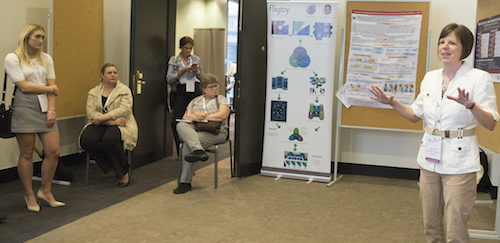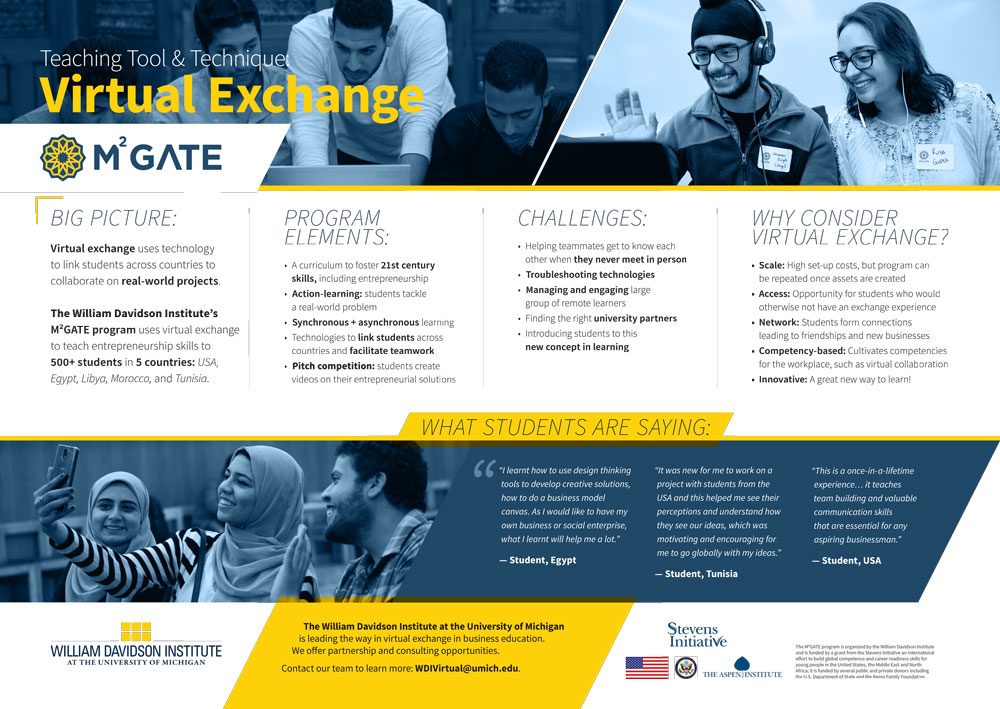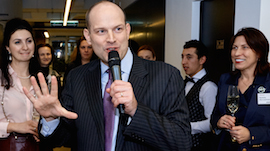
By Amy Gillett
How we can best prepare people to do business in a world changing fast under globalization, technological advances and the continuous disruption of industries is what drives us at WDI’s Education Initiative. One way we accomplish this is by identifying innovative models of management education and bringing these models to emerging markets. Ultimately, we aim to equip managers in these markets to compete in the global economy.
When I learned that CEEMAN would be focusing its 26th annual conference on changing the course of management development, I knew I wanted to contribute. CEEMAN is a network of more than 200 management education institutions from 51 countries. Its president, Danica Purg, also runs the IEDC-Bled School of Management in Slovenia, known for its innovative teaching methods. Last year, Professor Purg co-authored a fascinating article for WDI on the development of management education in Central and Europe over the past 25 years.
At the conference, CEEMAN issued the “Manifesto” — a clarion call for a change in the direction of management education. “Theory disconnected from practice no longer stands up as the only medicine managers need,” the document states. It also suggests that the change may come from the rising economies versus the developed economies: “The center of gravity of innovation in products and services as diverse as high-speed rail transport, container-lifting cranes, hotels, and internet shopping platforms has already shifted from West to East, and there are strong reasons to believe that management development may be next in line.”
The Manifesto emphatically spells out the need for management education to be more relevant to managerial practice as well as to local issues and markets. It highlights the need for business schools to deepen their connections with, and understanding of, today’s business world. It also calls for more focus on teaching excellence.
I headed to the CEEMAN conference, held in Prague this year, to learn more about the Manifesto’s revolutionary vision. I also went to present — under the theme of teaching excellence — on WDI’s latest entrepreneurship program: M²GATE. This program connects Michigan college students with students in four North African countries to work in teams to identify a social issue and pitch an entrepreneurial solution. The eight-week program is structured as a virtual exchange, connecting students across countries through technology. It is an innovative model, suggestive of the Manifesto’s calls for bold changes.

At the conference, I presented the structure of the program, the student feedback, the challenges we encountered and the benefits of the virtual exchange format. I found the conference attendees really sparked to the notion of virtual exchange. They recognized it as an innovative way to deliver management education.I discussed how it breaks down barriers between disciplines, connects students across cultures and is highly relevant to students’ lives as they identified and tackled a real-world issue. Importantly, it also shifts the epicenter of learning from the professor and the classroom to the students and the world at large. Furthermore, it focuses on many of the topics identified as critical in the Manifesto, including globalization, innovation, leadership and entrepreneurship.
After my presentation, I was approached by many professors and administrators who wanted to know how they, too, could implement virtual exchange. I was delighted to see that our M²GATE program could serve as a model for others. I hope it will catalyze many creative new programs and help advance management education into a new chapter in its evolution.
Note: This is one in an ongoing series of articles profiling past WDI interns and Multidisciplinary Action Project (MAP) team members and their career paths. Additional profiles in the series may be found here.
It was a trip to the Soviet Union for a student exchange program when Per Hong was a high school junior that sparked his lifelong interest and passion to work in that part of the world. So when he had narrowed his choices to three business schools for his MBA studies – the Wharton School at the University of Pennsylvania, Dartmouth College’s Tuck School of Business and the University of Michigan Business School (as it was known then) – he decided on Michigan because of WDI’s international student projects.

“It was the selling point for why I chose the University of Michigan,” said Hong, now a partner with A.T. Kearney and managing partner of the firm’s Moscow office. “The opportunity to spend time working in the region on student projects was a differentiator for me.”
Hong, who majored in Russian as an undergrad at Swarthmore College, got his first WDI student opportunity in summer 1995.
His WDI internship was with LET Aeronautics, a Czech Republic manufacturer of 18- and 32-passenger propeller aircraft that was in the process of privatizing after the collapse of the Soviet Union. They prided themselves on having a fleet of aircraft designed to land on unfinished runways in Siberia.
With the collapse of the Soviet market, they were left with nearly 40 aircraft and wanted to certify their planes so they could be sold in the West. Hong developed a marketing strategy for LET, including how it could sell its refurbished, durable aircraft in new, hard-to-reach markets like Latin America and Africa.
“It was fascinating to work in a brand new part of the world,” Hong said of his time in the Czech Republic. “This was a very old and proud company that was now having to suddenly reinvent itself. They were faced with real market economy issues related to how they dispose of three years of inventory, restructure to get profitable and rebrand themselves. It was an enriching experience to work with an indigenous company about to go global, and the challenges they faced at all levels in transitioning to a market mindset.”
During his second year of MBA studies, Hong was part of a WDI-sponsored International Multidisciplinary Action Project – or IMAP – team at the business school. He and his classmates worked on a market entry strategy for Whirlpool appliances in Russia. As part of the project, the team spent two weeks in Moscow and St. Petersburg surveying firsthand the developing retail landscape for washing machines in a country making its transition to a market economy.
“In contrast to my experience in the Czech Republic where I worked for a Czech company, in Russia I was working for a multinational seeking to enter a new market,” Hong said. “I gained a whole new perspective and appreciation for the specific kinds of challenges Western companies were facing in trying to adapt themselves to operate in these new transitional economies.”
He said working in the two countries was an “immense training ground at the time,” and immersing himself in different business cultures “profoundly shaped” him.
Today, Hong has more than 20 years of consulting and industry experience in North America, Europe and Russia. Hong credits WDI and its student projects with sparking “a passion to serve clients in these markets that still shapes what I do today.”
“Without question, I’m pursuing my passion,” he said. “Today, while Russia’s political and economic climate is creating a whole new set of transitional challenges for companies in the region – in some ways not dissimilar to the volatility of the mid-90s – I still reflect on my early experiences with WDI. I like to think I offer both a unique insight and a passion to equip both my multinational and Russian clients with the means to compete and thrive in a global economy. WDI was core in launching me down this path.”